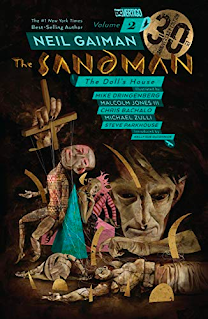Writer: Neil Gaiman
Artists: Sam Keith, Mike Dringenberg, Malcolm Jones III, Dave McKean
 |
| via Amazon |
Title: The Sandman, Volume 2: The Doll's House
Writer: Neil Gaiman
Artists: Mike Dringenberg, Malcolm Jones III, Chris Bachalo, Michael Zulli. Steve Parkhouse, Dave McKean
 |
| via Amazon |
The Sandman is widely considered one of the masterpieces of the comic book genre. Neil Gaiman teamed up with a small staff of master artists to tell the tale of Morpheus, King of the Dreamworld. Morpheus had been held captive for several decades. Now that he's free, he must clean up the mess created by those who have sought to fill the void in his absence. The story shifts not exactly seamlessly between demon-world, dream-world and real world.
As I have written before, though not for several years, Gaiman's work is hit-or-miss for me. I can't deny his command of language or narrative skill. The Graveyard Book is one of my favorites. But Gaiman often tends too far in the horror direction for my tastes. I first tried Preludes & Nocturnes several years ago and was deeply turned off. Maggots in people's eyes? A diner full of people being manipulated into killing each other? No thanks.
The new Netflix series sparked my wife's interest. She'd never read the comics before but is now eagerly seeking them out. She suggested I read the second book, The Doll's House, as a book swap. I needed to re-read the first volume to get oriented.
After being freed, Morpheus sets out to gather his dream-manipulating objects: a gas mask, a bag of sand and an amulet. All have fallen into the possession of unsuitable owners. I can't say I liked the story any better with the second reading. Still hauntingly beautiful at times? Yes. Still frequently gross and off-putting? Most certainly.
The Doll's House is better. The broad arc follows a mortal, Rose Walker, a young woman whose family has been torn apart. As she works to gather them all back together, she learns of the role she plays, unwittingly, within the dream world. Once again, some of the stories are lovely. The prologue is set in the African desert, a man relating a rite of passage tale to his grandson after the latter's ritual circumcision. In Part Four, Morpheus makes a friend in 14th century England. After granting him immortality, Morpheus visits his pal every hundred years to see how he's doing.
But there are also truly sickening moments over the course of the story. Maybe this is the trade off I have to accept with the Sandman series if I'm to continue with it. And I think I will. Eventually. Gaiman is a genius. If I can endure his horror stories, I will be rewarded with occasional elegance. Even Rose's story, while frequently disgusting, is beautiful in the end.
The artwork is undeniably brilliant. With several different artists come a variety of styles. Sometimes, panel sequence gets confusing, which annoys me. But overall, the visual presentation is top-notch. Even the gross stuff.
I don't know if I'm interested in the TV series or not. I suppose I am curious to see how it all translates to screen. If I do watch, I may occasionally need to remove to another room from time to time.
It's been a long time since I read Sandman, but I know immediately when I began reading it that Gaiman was the best writer comics had, possibly the best writer comics have ever had, and there have been many excellent comic book writers.
ReplyDeleteMy feeling upon watching the series is that they did a great job of capturing the feel of the comics. It was excellent, actually.
Not quite as much gross stuff as they wanted the TV series to have a wider audience.
The Graveyard Book is one of my favorites by him as well. I had him sign a copy to my son, who also loved it when he read it.
(Gaiman owns a copy of my Shadow Spinner book. The Man with No Eyes was in no small part inspired by Corinthian.)
I expect I'll try the TV series at some point.
DeleteBest writer in comics... high praise. Based on my explorations so far, I think I'd go with Alan Moore, though Frank Miller certainly impresses.